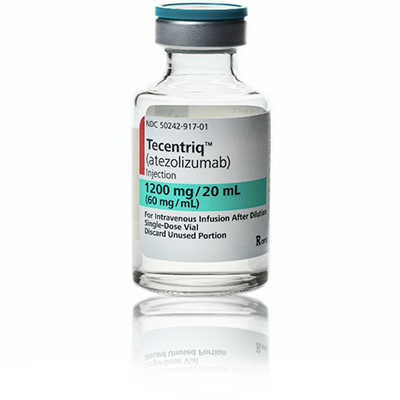FDA Approves Tecentriq
FDA Approves Tecentriq (atezolizumab) for Urothelial Carcinoma
May 18, 2016 -- The U.S. Food and Drug Administration today approved Tecentriq (atezolizumab) to treat the most common type of bladder cancer, called urothelial carcinoma. This is the first product in its class (PD-1/PD-L1 inhibitors) approved to treat this type of cancer.
"Tecentriq provides these patients with a new therapy targeting the PD-L1 pathway," said Richard Pazdur, M.D., director of the Office of Hematology and Oncology Products in the FDA’s Center for Drug Evaluation and Research. "Products that block PD-1/PD-L1 interactions are part of an evolving story about the relationship between the body’s immune system and its interaction with cancer cells."
Tecentriq targets the PD-1/PD-L1 pathway (proteins found on the body’s immune cells and some cancer cells). By blocking these interactions, Tecentriq may help the body’s immune system fight cancer cells. Tecentriq is the first FDA-approved PD-L1 inhibitor and the latest in the broader class of PD-1/PD-L1 targeted biologics approved by the FDA in the last two years.
Tecentriq is approved for the treatment of patients with locally advanced or metastatic urothelial carcinoma whose disease has worsened during or following platinum-containing chemotherapy, or within 12 months of receiving platinum-containing chemotherapy, either before (neoadjuvant) or after (adjuvant) surgical treatment. Urothelial carcinoma is the most common type of bladder cancer and occurs in the urinary tract system, involving the bladder and related organs. The National Cancer Institute (NCI) estimates 76,960 new cases of bladder cancer and 16,390 deaths from the disease in 2016.
The safety and efficacy of Tecentriq were studied in a single-arm clinical trial involving 310 patients with locally advanced or metastatic urothelial carcinoma. This trial measured the percentage of patients who experienced complete or partial shrinkage of their tumors (objective response rate). The study also looked at the difference in effect based on “positive” versus “negative” expression of the PD-L1 protein on patients’ tumor-infiltrating immune cells. In all patients, 14.8 percent of participants experienced at least a partial shrinkage of their tumors, an effect that lasted from more than 2.1 to more than 13.8 months at the time of the response analysis. In patients who were classified as “positive” for PD-L1 expression, 26 percent of participants experienced a tumor response (compared to 9.5 percent of participants who were classified as “negative” for PD-L1 expression).
While patients who received Tecentriq experienced a tumor response across the study, the greater effect in those who were classified as “positive” for PD-L1 expression suggests that the level of PD-L1 expression in tumor-infiltrating immune cells may help identify patients who are more likely to respond to treatment with Tecentriq. Therefore, today the FDA also approved the Ventana PD-L1 (SP142) assay to detect PD-L1 protein expression levels on patients’ tumor-infiltrating immune cells and help physicians determine which patients may benefit most from treatment with Tecentriq.
The most common side effects of treatment with Tencentriq were fatigue, decreased appetite, nausea, urinary tract infection, fever (pyrexia) and constipation. Tencentriq also has the potential to cause infection and serious side effects that result from the immune system effect of Tencentriq (known as “immune-mediated side effects”). These severe immune-mediated side effects involve healthy organs, including the lung, colon and endocrine system.
The FDA granted the Tecentriq application breakthrough therapy designation, priority review status and accelerated approval for this indication. These are distinct programs intended to facilitate and expedite the development and review of certain new drugs in light of their potential to benefit patients with serious or life-threatening conditions.
Tecentriq is marketed by Genentech based in San Francisco, California. The Ventana PD-L1 (SP142) assay complementary diagnostic for Tecentriq is marketed by Ventana Medical Systems, based in Tucson, Arizona.
The FDA, an agency within the U.S. Department of Health and Human Services, protects the public health by assuring the safety, effectiveness, and security of human and veterinary drugs, vaccines and other biological products for human use, and medical devices. The agency also is responsible for the safety and security of our nation’s food supply, cosmetics, dietary supplements, products that give off electronic radiation, and for regulating tobacco products.
Source: FDA

Posted: May 2016
Related articles
- FDA Approves Genentech’s Tecentriq as First-Ever Therapy for a Certain Advanced Rare Sarcoma Called Alveolar Soft Part Sarcoma (ASPS) - December 9, 2022
- FDA Approves Genentech’s Tecentriq as Adjuvant Treatment for Certain People With Early Non-Small Cell Lung Cancer - October 15, 2021
- FDA Approves Genentech’s Tecentriq plus Cotellic and Zelboraf for People With Advanced Melanoma - July 30, 2020
- FDA Approves Genentech’s Tecentriq in Combination With Avastin for People With Hepatocellular Carcinoma - May 29, 2020
- FDA Approves Genentech’s Tecentriq as a First-Line Monotherapy for Certain People With Metastatic Non-Small Cell Lung Cancer - May 18, 2020
- FDA Approves Genentech’s Tecentriq Plus Chemotherapy (Abraxane and Carboplatin) for The Initial Treatment of Metastatic Non-Squamous Non-Small Cell Lung Cancer - December 3, 2019
- FDA Approves Genentech’s Tecentriq in Combination With Chemotherapy for the Initial Treatment of Adults With Extensive-Stage Small Cell Lung Cancer - March 18, 2019
- FDA Grants Genentech’s Tecentriq in Combination With Abraxane Accelerated Approval for People With PD-L1-Positive, Metastatic Triple-Negative Breast Cancer - March 8, 2019
- FDA Approves Genentech’s Tecentriq in Combination With Avastin and Chemotherapy for the Initial Treatment of Metastatic Non-Squamous Non-Small Cell Lung Cancer - December 6, 2018
- FDA Grants Genentech’s Tecentriq (atezolizumab) Accelerated Approval as Initial Treatment for Certain People with Advanced Bladder Cancer - April 17, 2017
- FDA Approves Genentech’s Cancer Immunotherapy Tecentriq (Atezolizumab) for People with a Specific Type of Metastatic Lung Cancer - October 18, 2016
Tecentriq (atezolizumab) FDA Approval History
More news resources
- FDA Medwatch Drug Alerts
- Daily MedNews
- News for Health Professionals
- New Drug Approvals
- New Drug Applications
- Drug Shortages
- Clinical Trial Results
- Generic Drug Approvals
Subscribe to our newsletter
Whatever your topic of interest, subscribe to our newsletters to get the best of Drugs.com in your inbox.
